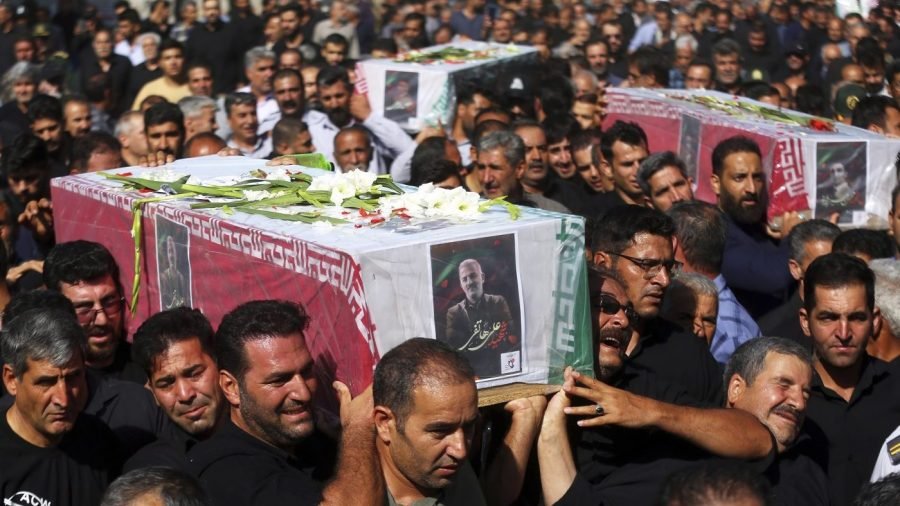
Israel has long pursued a strategy to remain the Middle East’s sole nuclear-armed state, using military force to preempt or prevent other regional powers from acquiring nuclear-weapons capabilities. But Israel’s strikes on Iran risk backfiring, with a wounded foe more determined than ever to acquire the nuclear bomb.
Israel’s strategic posture, institutionalized as the “Begin Doctrine” after former Prime Minister Menachem Begin, holds that it will not allow any neighboring state to even approach nuclear-weapons capability. In practice, Israel has expanded this doctrine to block even peaceful nuclear programs under international safeguards.
The Begin Doctrine was first operationalized in 1981 with the bombing of Iraq’s Osirak nuclear reactor, which was built by France for peaceful research and subject to International Atomic Energy Agency inspections. Though Iraq was a party to the Nuclear Non-Proliferation Treaty and had agreed to stringent safeguards extending beyond international inspections to prevent reactor misuse, Israel claimed Baghdad harbored military ambitions and struck preemptively.
The attack, which destroyed the $275 million reactor just before it was to become operational, was carried out with U.S.-supplied F-16 and F-15 aircraft. One French engineer and 10 Iraqi soldiers were killed. The operation triggered minimal diplomatic fallout for Israel, but pushed Saddam Hussein’s nuclear program underground — an outcome that would later lead to the 2003 U.S. invasion and occupation of Iraq under the false pretext of dismantling weapons of mass destruction.
In 2007, Israel again invoked the Begin Doctrine to destroy a suspected nuclear reactor under construction in Syria. The al-Kibar facility was flattened in an airstrike dubbed Operation Orchard. Israeli intelligence claimed the project, allegedly aided by North Korea, had covert military dimensions. The IAEA concluded three years later that the destroyed facility was “very likely” a nuclear reactor under development.
These precedents pale in comparison to Israel’s current military campaign against Iran, dubbed Operation Rising Lion, which aims to wipe out Iran’s nuclear program. The stakes are exponentially higher: Iran is a larger, more capable adversary located beyond Israel’s immediate neighborhood. And unlike Iraq or Syria in decades past, Iran has already accumulated significant nuclear know-how and material.
Prime Minister Benjamin Netanyahu, invoking the Begin Doctrine, claimed that Iran was on the verge of developing nuclear weapons and vowed that Israeli strikes would continue “as long as necessary” to neutralize the threat. But this assertion lacks backing from key intelligence assessments.
On March 25, U.S. Director of National Intelligence Tulsi Gabbard testified that the American intelligence community had assessed that “Iran is not building a nuclear weapon.” However, Gabbard — and the IAEA separately in a recent report — expressed concern over Iran’s stockpile of uranium enriched to 60 percent purity, which, if enriched further to 90 percent, would become weapons-grade material. The IAEA, like Gabbard, concluded there was no evidence of a structured nuclear-weapons program underway.
Yet Israel pressed ahead with its military strikes. Netanyahu’s government, in coordination with the Trump administration, seems to believe that such force will buy leverage at the diplomatic table.
In reality, the attacks are likely to achieve the opposite. Far from forcing concessions, the Israeli strikes have derailed nuclear diplomacy. Tehran has suspended talks indefinitely, accusing Washington of coordinating and authorizing the Israeli operation. This mirrors a pattern from Trump’s first term, when his “maximum pressure” campaign on Iran backfired, hardening Iranian resolve rather than moderating it.
Indeed, if Israel’s goal is to eliminate the Iranian nuclear threat, this strategy may prove deeply counterproductive.
Two key factors make this preemptive war particularly perilous. First, Israel cannot destroy Iran’s nuclear program by military means alone. Tzachi Hanegbi, Netanyahu’s own national security adviser, acknowledged on Israeli television on June 13 that Iran’s program “cannot be destroyed through kinetic means.” A negotiated settlement, he suggested, was the only sustainable option.
But with the collapse of diplomacy and deepening Iranian hostility, Israel may be forcing Iran toward the very nuclear path it wants to prevent. Tehran could emulate North Korea’s playbook: withdraw from the NPT, eject IAEA inspectors and weaponize its nuclear assets at speed. North Korea withdrew from the NPT in 2003 and tested a nuclear bomb just three years later, becoming a de facto nuclear-weapons state.
Iran, heavily sanctioned and increasingly isolated, may now conclude that it has little to lose from following suit. If Iran raises enrichment from 60 percent to 90 percent purity — a short technical leap — it could rapidly convert its uranium stockpile into bomb-grade material. That would mark a historic failure of U.S. and Israeli nonproliferation strategy and hand Tehran the strategic deterrent it long claimed not to seek.
Second, the underlying logic of the Israeli campaign may no longer be about nuclear rollback but rather regime change. Netanyahu has openly called for the fall of the Iranian regime, and Israeli strikes have expanded beyond nuclear and military sites to include economic infrastructure, energy facilities and civilian aviation hubs.
This broadening of war aims could lock Israel into a prolonged military confrontation with Iran — a campaign that could exact heavy human and economic costs. Even before the Iran operation, Israeli society was showing signs of war fatigue, with growing numbers of reservists declining to report for duty.
Meanwhile, U.S. forces are increasingly entangled in the conflict. In defending Israel from retaliatory missile and drone attacks, American troops are already operating in air, land and naval roles. A broader U.S. intervention remains a distinct risk.
Israel has long justified its aggressive posture on existential grounds. Its small size and hostile environment, it argues, require proactive and sometimes disproportionate defense measures. But the line between deterrence and provocation is perilously thin — and it may now have been crossed.
History shows that Israel’s pursuit of short-term tactical victories often undermines its long-term strategic interests. The Osirak attack contributed to decades of conflict in Iraq. The al-Kibar strike delayed but did not eliminate Syria’s nuclear ambitions. And now, Operation Rising Lion could go down as the moment when Israel’s policy of preemption made an Iranian bomb inevitable.
Israel remains the Middle East’s preeminent military power, possessing not only superior conventional forces but also undeclared nuclear weapons. That should afford it the confidence to pursue measured strategies.
Instead, by trying to preserve its nuclear monopoly through force, Israel risks fueling the very proliferation spiral it has long sought to prevent.
Brahma Chellaney is a geostrategist and the author of nine books, including the award-winning “Water: Asia’s New Battleground.”


